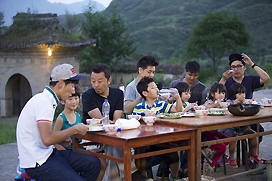
The one-child policy has been blamed for everything from a shortage of brides to an epidemic of childhood obesity – but, to judge from Chinese television, the bigger worry is that it has created a generation of wimps.
計劃生育政策歷來飽受指責,從婚齡女性不足到兒童肥胖癥流行,件件都可以怪到計劃生育頭上。但如果從中國的一檔電視節目判斷,這項政策更大的隱患在于創造了懦弱的一代人。
Dad, Where Are We Going? is a reality television show that shot to mainland fame recently because it taps into middle-class angst about whether China is raising its children right. The kids on the show are hardly more than toddlers, and they are sent off with Dad to – among other things – live in a tent in the deserts of central China and forage for food in a peasant village. Is a generation raised on iPads and junk food up to the rigours of the camp stove and the camp potty? And more to the point, is Dad up to it?
真人秀節目《爸爸去哪兒》近來在中國內地一炮而紅,因為這檔節目觸及了中產階級的焦慮——中國人的育兒方法到底正不正確。節目里的幾個小朋友剛過蹣跚學步的年齡,就跟爸爸一起被送到中國西部沙漠住帳篷,或是在農村尋找食物,以及完成若干其他任務。玩著iPad、吃著垃圾食品長大的這一代,能適應野營爐具和廁所的艱苦嗎?更重要的一點是,爸爸們能適應嗎?
Many would argue that the last thing to expect from reality TV is a dose of social reality, but this show seems more authentic than most – perhaps because the main characters are children so young that they do not know enough to hide it when they want to act like spoiled brats. The dads, all of whom are Chinese celebrities and some of whom are television actors in “real” life, are inevitably less candid than their kids. After one little girl whines for nearly an entire show, her Olympic gold medalist father alludes to how he might be tempted to just whack her if they were in the privacy of their own home – but, with the whole country watching, he thinks the wiser course is a quick cuddle.
很多人認為真人秀節目僅剩的值得期待之處,就是來點社會現實,但這檔節目似乎比絕大多數真人秀節目都真實得多——或許因為主角是孩子們,他們還太小,還不懂得在想要發脾氣時偽裝自己。這些爸爸們全部是中國的名人,有幾位在“真實”生活里還是影視演員,他們當然不會像自己的小孩那樣率直。有一集節目里,一個小姑娘幾乎從頭哭到尾,她的奧運冠軍父親暗示如果他們是在自己家里,他可能會忍不住兇她,但在全國觀眾面前,他覺得更明智的做法是趕緊抱抱孩子。
Like much on Chinese television, this is a copy of a foreign show – a South Korean series about celebrity dads and their offspring. But in China, besides merely testing whether famous dads can boil water and tie shoelaces, it has a deeper resonance. The country is now raising its second generation of “little emperors” – only children, often born to parents who are themselves only children – and everybody wants to know if they are going to end up even more spoiled, immature and selfish than their overindulged parents.
如同中國的許多節目一樣,《爸爸去哪兒》也是復制的外國節目——韓國的一檔對準名人爸爸的親子系列節目。但是中國版的《爸爸去哪兒》并不僅僅是考驗名人爸爸能不能燒開水或是系鞋帶,它還引起了更深層次的共鳴。這個國家現在正在養育第二代“小皇帝”(獨生子女,他們的父母通常也是獨生子女),人人都想知道這批孩子長大以后,會不會比他們那幫在溺愛中成長的父母更加驕縱、幼稚、自私。
A recent survey by China Youth Daily found that most viewers watch the show for what they can learn about how to raise balanced children – and only a quarter watch it for a peek at celebrity family life. Last month the show even became the subject of an academic seminar at the Shanghai Academy of Social Sciences, which urged parents of “little emperors” to give them more independence – and get Dad more involved in child-rearing.
《中國青年報》(China Youth Daily)最近一項調查發現,多數觀眾是抱著了解“育兒之道”的想法收看這檔節目的,只有 25.9%的人是沖著“明星家庭的隱私”去觀看的。上海社科院甚至在2013年12月針對該節目舉辦了一次專題論壇,鼓勵“小皇帝”的父母更多培養孩子獨立,而且爸爸更多地參與育兒。
Many western parents follow a simple policy when choosing their parenting style: they just do the opposite of what their own parents did. Dad, Where Are We Going? seems to encourage China’s newest generation of parents to do that, too: launch a counter-revolution in Chinese parenting by refusing to coddle, pamper and overprotect their kids – or, at least, not to the degree that they themselves were coddled, pampered and overprotected.
許多西方父母在選擇養育方式時都遵循著一條簡單的方針:只要跟他們自己父母的養育方式反著來就對了。《爸爸去哪兒》似乎在鼓勵中國新一代父母們也這么干:對中國傳統養育方式發起一場革命,拒絕溺愛、嬌慣、過度保護孩子,起碼比自己當初被溺愛、嬌慣、過度保護的程度弱些。
The tough love starts in episode one, when Dads and tots go off to live in peasant homes with everything from goats in the courtyard to hairy spiders on the bedclothes. The kids have to be peeled away from their iPads and their pops, prompting marathon tantrums from pampered participants. But, by the end of that episode, even the most coddled had gone off on a village-wide scavenger hunt to assemble the fixings for dinner and return bursting with the pride of a job well done – and done by themselves.
從第一集節目起,嚴厲的愛就展開了。爸爸和孩子們住進農民家,院子里有山羊,床單上還爬著毛茸茸的蜘蛛。孩子們被奪走了iPad,還要離開自己的老爸,個別格外驕縱的小家伙被刺激得沒完沒了地大發脾氣。但是到這一集末尾時,即使最嬌慣的小孩都已出發參加尋寶任務,在整座村莊里收集晚飯需要的用具和食材,然后帶著完成任務——而且是由他們獨立完成——的自豪感而歸。
Later, they all go off by camel to pitch a tent in the desert, pretending like all good parents everywhere that the children are actually helping pitch the tent rather than merely being annoying. One of the dads has his thumb smashed while pretending to let his son hammer in a tent peg. And another cannot figure out how to light the camp stove but refuses to take advice from his six-year-old, who does in fact know how to do it.
在之后的一集節目中,所有人騎著駱駝去沙漠里搭帳篷。像所有優秀家長一樣,爸爸們假裝孩子們真的在幫忙搭帳篷,雖然他們不過是添亂而已。其中一位老爸假裝讓兒子砸帳篷樁,結果被砸到了大拇指。另一位老爸不知道怎么點燃野營爐子,卻拒絕接受自己6歲孩子的建議,而他的孩子確實知道怎么點爐子。
One begins to wonder which generation it is that we are supposed to be worried about. For, apart from one three-year-old – who was probably too young to be subjected to tent torture anyway – the rest of the kids grew up monumentally in the few short weeks between the peasant village and the desert. They ended up seeming no more spoiled than any toddlers anywhere – and less so than my own two teenagers when they were recently called upon to endure a camel ride in a Chinese desert (even without sleeping overnight there).
我們不禁開始懷疑到底該擔心哪輩人。在農村之旅到沙漠之旅的短短數周內,除了一個3歲的孩子(這么點年齡或許不該受這番折騰),其他孩子都獲得了驚人的成長。這群孩子到最后看起來一點兒也不比其他地方的小孩嬌慣——我的兩個孩子已經十幾歲了,最近受邀去中國沙漠騎一次駱駝,他們的忍耐力還不如那幾個小孩,而且他們還不用在沙漠里過夜。
Maybe China’s children are not in as much peril as the conventional wisdom – and their little emperor parents – would have it. But just wait until they become teenagers.
或許中國孩子并不像傳統觀點以及他們的小皇帝父母所認為的那樣叫人擔憂。不過還是等他們變成青少年時再下結論吧。


